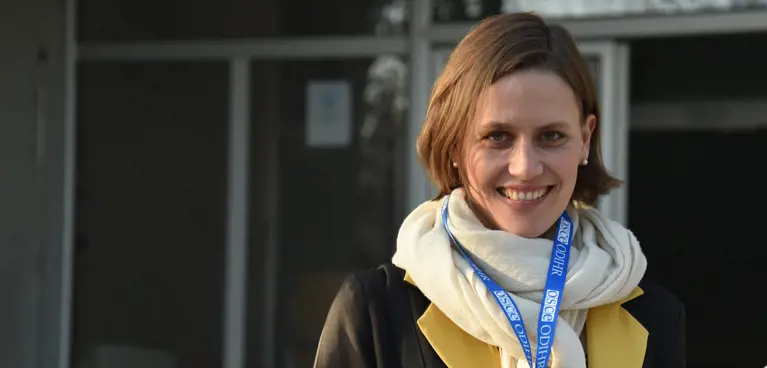
Nathalie Ndimubanzi (left) and Judith Maroy (right) – founders of the Zaida Catalán Club.

Karolina Riedel is a statistician and member of the FBA’s resource pool for election observation missions. She regularly travels to countries where elections are being held in order to compile reports from the observers. It is important in order to get an overall picture of the fairness of an election.
FBA is tasked with recruitment, training and secondment of personnel to the international election observation missions in which Sweden participates. FBA seconds Swedish personnel to approximately 20 election observation missions held by the EU or OSCE each year. The election observation missions are often quickly established. In order for the FBA to be able to contribute to the missions by deploying personnel with short notice, FBA has a resource pool with qualified staff available. The pool consists of short-term and long-term observers, and statisticians like Karolina.
– An election observation mission consists of various parts. The so called core team and the long-term observers are on deployment for several weeks. They look at the media coverage and the drawing up of voting lists. The short-term observers monitor what goes on during election day; from the opening of the polling stations to the ballot count. They all fill out forms about their observations and send them to me. My mission is to compile the results and give it to the deputy head of mission and the analysts, so that they can present a report the day after the elections. During a mission, I am usually deployed to the country where there is an election for 8–9 days. But my contracts last longer than that. Before I travel abroad I have to prepare the forms.
– I studied economics at university, and got in touch with a local election observation organization in Sri Lanka. I was there during the elections in 2010, I coordinated the observers together with a colleague. When I came home to Sweden I saw that the Swedish resource pool for election observation missions was open for applicants, so I applied and was accepted. I have since participated in many election observation missions.
– I used to work with statistics and opinion polls at the University of Gothenburg. Lately I have been on parental leave interspersed with election observation missions. I am soon to start a new job at the Swedish Ministry of Finance. My deployments to election observation missions are usually brief, so combining missions with a steady job and a family is possible.
– Elections are a very concrete part of a democracy. It feels meaningful to be present while an election is taking place, and to monitor how it goes. An election observation mission watches the election with the eyes of a voter. We look at, for example, if the voting secrecy is respected, if the voters are being pressured or influenced, and if the ballot count is fair and accurate. We are often being told by the locals that it is important that we are present, and if we had not been there the situation may have been different. It is also great fun to be on a mission together with incredibly professional people from all over the world.
Photo: Tomasz Janczy, Jay Baker, AFGE
MORE FROM HOME
Two former recipients of FBA’s 1325 Scholarship, Nathalie Ndimubanzi and Judith Maroy, have founded the Zaida Catalán Club – a youth-led organization focused on women, peace, and security in the Democratic Republic of Congo (DRC). How did the scholarship pave the way from theory to action?
2024-10-18 14:40FBA has both increased and adapted its work in Ukraine in the wake of Russia's invasion.
FBA in UkraineKlara Grenhagen works as a specialist at FBA's Africa unit with a focus on dialogue, reconciliation and peace processes.
More about our expertsFBA is part of Sweden’s development aid within the area of peace and security
Read more about the countries where we work